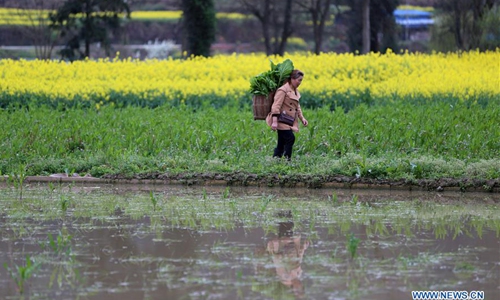Tourism sows bright future for ancient village
Source:Xinhua-Global Times Published: 2020/6/23 16:08:41

A farmer plants in the fields at Ganjing Village of Guiyang City, southwest China's Guizhou Province, March 9, 2020. Local villagers are busy with farm work as the weather is getting warmer. (Photo by Zhao Song/Xinhua)
Liu Shengxian, a farmer in East China's Anhui Province, did not expect that rice transplanting - his traditional farm work - would become an object of interest for visitors from cities.
His hamlet with the ancient name "Daoyuan" in the Yunfeng village of Anqing City has held a rice planting festival, which drew tourists from afar to experience work in the fields.
The visitors were excited to take pictures of Liu and his buffalo working in the paddy fields. Liu's old home fashioned out of rammed earth and the bamboo forests behind it amazed the tourists.
"They're willing to spend money to experience country life. The world has really changed," said the 73-year-old.
The ancient village, tucked away in the boundless Dabie Mountains, was once connected to the rest of the world by only a dirt track some two meters wide.
Villagers lived in ancient rammed-earth dwellings and fed themselves from the crops grown on a small plot of land in the mountains.
In 2014, half of the 14 families in the village, including Liu's, were identified as poor households.
At the time, Liu said, he had just hoped the dirt road could be repaired and he could borrow some money to tear down his old house to build a new one.
However, unexpected changes in the village, which is under the jurisdiction of Huangwei Town, have disrupted his plans in recent years.
Based on its ancient bucolic sights, the village began to develop a tourism model to help local households emerge from poverty.
"My first impression of the village was that it was poor but unique," said Shu Hanbing, former Party chief of Huangwei Town who was in charge of the protection and development of the ancient hamlet.
"The ancient village and dwellings should be preserved, but poverty should be cast off," said Shu.
"While protecting the village, we developed it moderately so that villagers could benefit from it and their ways of farming and life could continue for another few decades," Shu noted.
After three years of development work, all poor households in the ancient village have now been lifted out of poverty. The dirt track has been transformed into a road five meters wide.
Liu has become part of the transformation by acquiring shares in his old house, and his land has been transferred to the village's new operating company.
"The company hired me to farm and I can earn about 50,000 yuan ($7,071) a year," Liu said. He also has a tea garden and sells local products to tourists to earn more for a better life.
Posted in: INDUSTRIES,ECONOMY